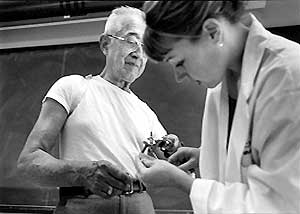 |
|||||||||
|
Outreach |
|
Designated One of Four Regional Networks in the Country
The Western Rehabilitation Research Resource Network (RehabNet-West), based at the UW Department of Rehabilitation Medicine, has received a five-year, $750,000-per-year grant from the NIH National Center for Medical Rehabilitation Research. The National Institutes of Health had earlier designated RehabNet-West as one of the country’s four regional rehabilitation research resource networks. There are now networks in the West, Midwest, South and Northeast. Each is designed to enhance rehabilitation research in its particular region.
Dr. Marjorie Anderson, professor and vice chair of the UW Department of Rehabilitation Medicine and also professor of physiology and biophysics, is the program director of RehabNet-West. The network serves a 15-state western region and includes some services based at the University of California, Los Angeles.
 |
Rehabilitation medicine patient John Niwa volunteers as a model for students learning to fit prosthetics. |
RehabNet-West has two scientific research cores and an information technology core, and supports three pilot research projects. In the information technology core, Dr. Kurt Johnson, associate professor of rehabilitation medicine, and Dagmar Amtmann, program manager for rehabilitation, provide the structure for interactive training programs, consultation by the scientific cores and access to library search tools.
The experimental design/biostatistics scientific resource core, which provides consultation and training, is directed by Dr. Jodie Haselkorn, associate professor of rehabilitation medicine. The neural imaging/recovery core is based in Los Angeles and will provide access to UCLA facilities and expertise in functional magnetic resonance imaging, positron emission tomography, and transcranial magnetic stimulation.
The Department of Rehabilitation Medicine helps individuals to increase mobility and productivity. This year, two gifts strengthen its efforts. The first was from volunteer and patient John Niwa and his wife, Marie, made an endowed gift to the department’s prosthetics and orthotics program. For many years, Niwa has volunteered in the classroom where he serves as a model patient for students learning to make and fit prostheses. The second gift was form the Ford Motor Company Fund which donated a newly updated van. The van is used in teaching rehab patients how to drive a motor vehicle safely by using adaptive equipment.
|
| UW AMC Medical Center | UW School of Medicine | Harborview | UW MC | Search UW AMC | UW Home | Contact Us | ©2001-2002, University of Washington Academic Medical Center. All rights reserved. Please honor our copyrights. |
|